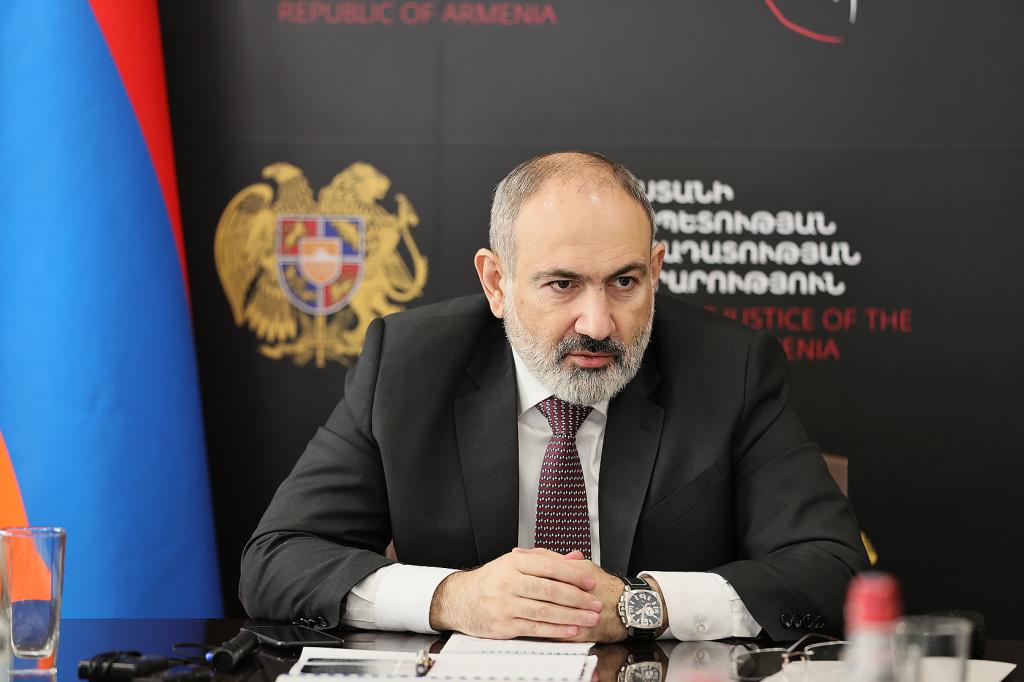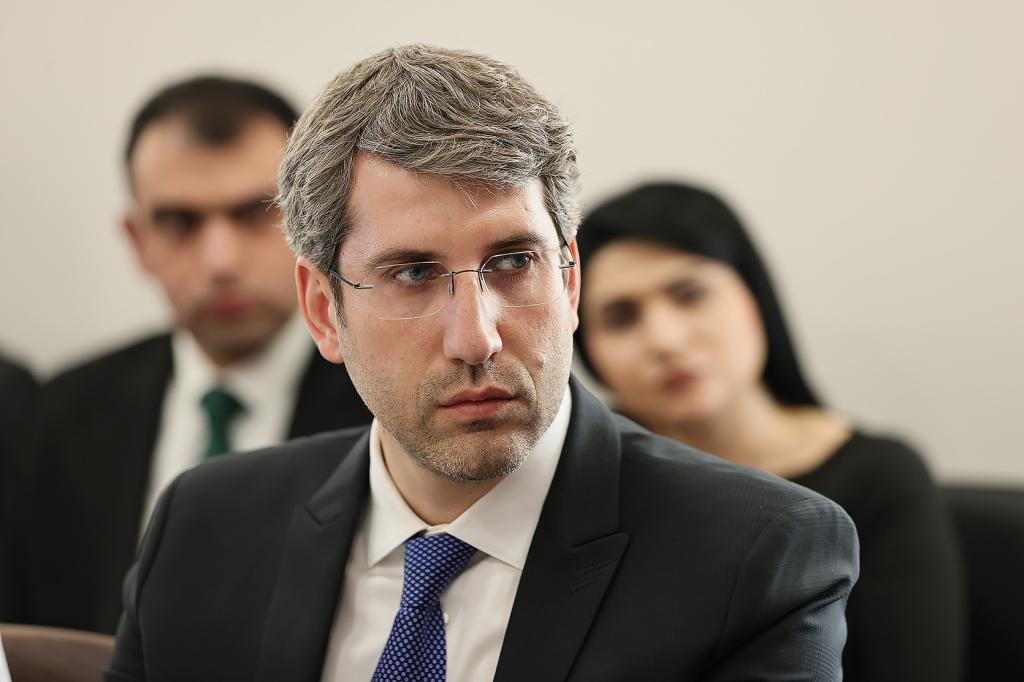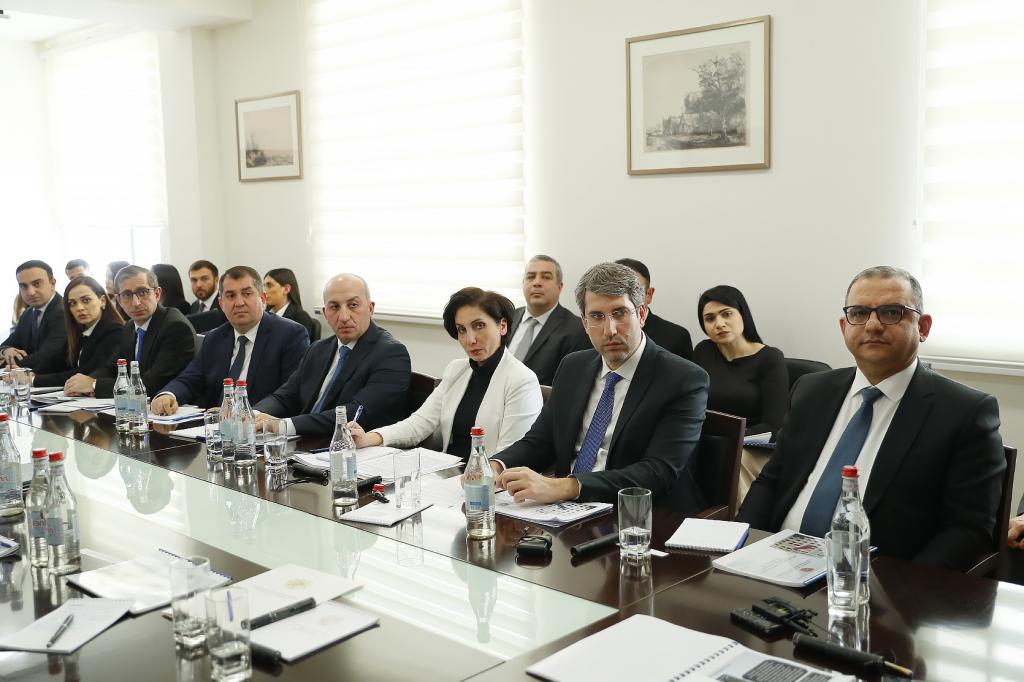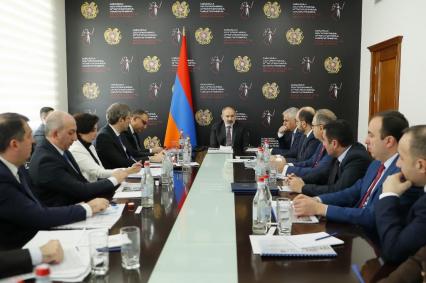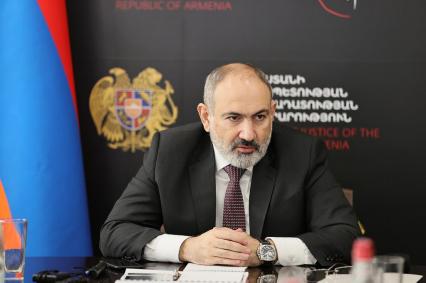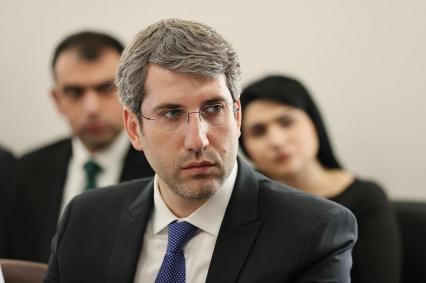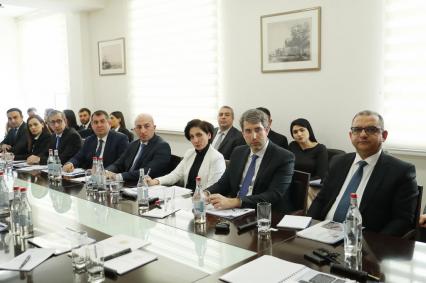On 18 January, Prime Minister Nikol Pashinyan visited the Ministry of Justice to discuss the report of the government agency on its activities for the year 2023.
19/01/2024
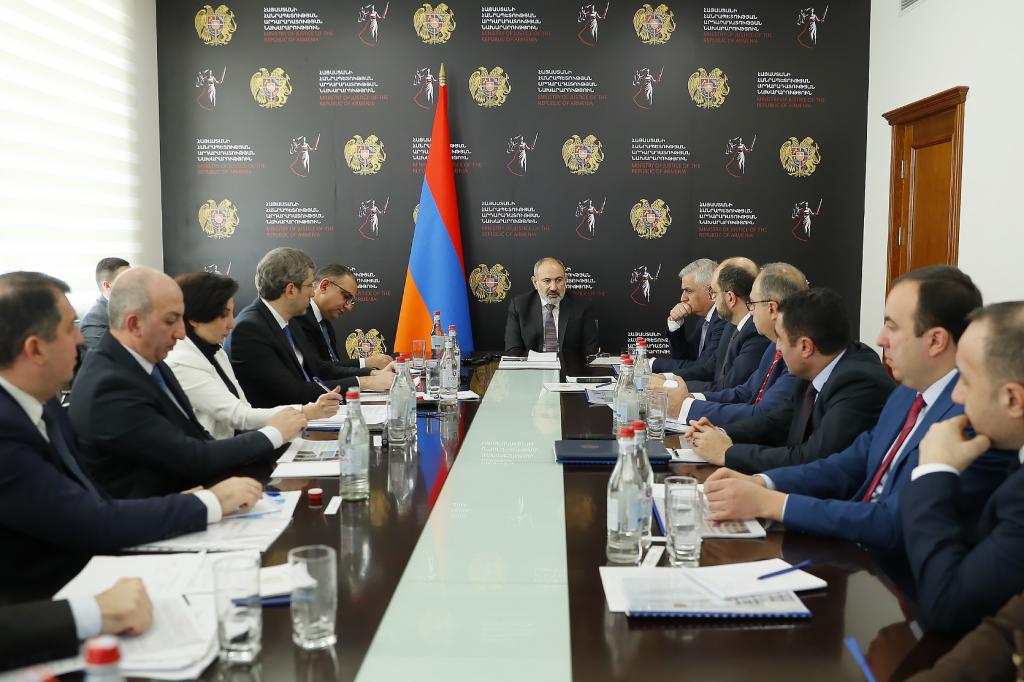
On 18 January, Prime Minister Nikol Pashinyan paid a visit to the Ministry of Justice to discuss the report of the government agency on its activities for the year 2023.
Prior to the discussion, the Prime Minister emphasised two points: "Firstly, the Ministry of Justice is engaged in the activities of the demarcation commission. I would like to stress the strategic importance of the demarcation process, as, surely, there are very serious political, socio-psychological and security issues here.
It is clear and obvious that we live in a world that is changing very rapidly and in unpredictable directions, and it is crucial to provide an answer to the following question once and for all: What is our vision and formula for ensuring the security of the Republic of Armenia? We have held many discussions on this issue in various formats, and my conclusion is that the cornerstone for ensuring the security of the Republic of Armenia is legitimacy. What does this mean? This means that we should formulate the problem very clearly; of course, the problem or the formulation of the problem is very obvious, but we should not hesitate to establish this again as a fact, and the fact is that we are setting the objective to see the Republic of Armenia become functioning and develop as a legal and democratic state within its internationally recognised borders, and this should be the strategic perception of the future of our country, that is, the Republic of Armenia as a sovereign, legal, democratic and social state. Of course, the list can go on, but I am focusing on the primary directions at the moment.
The question arises: What is the territory of the Republic of Armenia? I actually want to emphasise once again that we do not need to search for an answer to this question; instead, we should take the existing answer directly from the shelves and put it on the table. I can't specify exactly how many years, but for a long time, the dimensions of the sovereign territory of the Republic of Armenia have been recorded according to the land balance of the Republic of Armenia. In other words, the Government of the Republic of Armenia periodically approves land balance of the Republic of Armenia. This happened both before and after 2018, and eventually we need to record this and assert our legitimacy, ask the valid questions and state the expectations based on this foundation and logic. Furthermore, I link and induce the legitimacy of our actions and positions at the conceptual level within the scope of the logic of ''Homeland is the State'' concept.
But why am I talking about this today, here at the Ministry of Justice? It is because what is said means that the role of our legal community in the ensuring of external security will continue to grow. This is something that is important to emphasise, and I think that is obvious, but there are some obvious things that we all, or perhaps or at least I, or many colleagues, overlook in our daily lives. Typically, when we think of security, we think of the Army, the Armed Forces and diplomacy. Both are right, so, there is no problem here, but we forget the essential legitimacy of ensuring security, and it is our legal community that first and foremost performs the function of ensuring security. And I want to emphasise this in the presence of the Minister of Justice, the Chairman of the Standing Committee on State and Legal Affairs of the National Assembly. I also want to highlight the role of the Constitutional Court in this process, and the role of the judicial system in general. I want us to have the disposition to get involved in exactly this kind of work, which, I believe, will significantly enhance the effectiveness of security in this stage.
But again, I reiterate that we should frame legitimacy within the concept of ''Homeland is the State'', because when looked at from different angles, sometimes there can be a wide scope of legitimacy. However, in this case, by saying ‘scope’, I am referring to the sovereign, internationally recognised territory and borders of the Republic of Armenia."
Moving on to the next point, Prime Minister Pashinyan mentioned the following: "The world is changing, our region will also inevitably change, and the Republic of Armenia will also change and is changing. We can treat this change in many different ways, but regardless of how we treat evolution, it is happening. Therefore, our position should not be to stop this evolution, which is an illogical approach, as stopping the evolution leads to degradation; instead, we should govern in alignment with the state interests of the Republic of Armenia.
In this regard, during one or two work-related discussions with the Minister of Justice, I established the fact that, in my opinion—and that of several colleagues—we need a new Constitution for the Republic of Armenia, not just a constitutional amendment, and I am expressing this opinion in order to make it a topic for wider discussion. I want to emphasize that when discussing these topics, the initial questions often raised are the following: What system of governance do we want to change and for whom?
I want to emphasise that my publicly expressed position on this issue remains unchanged. I am convinced — though during a period of uncertainty, it has been proven at times that the parliamentary model of governance is the most suitable for the Republic of Armenia at least from my point of view and that of several colleagues, considering our democratic aspirations and strategies. Moreover, I am now even more convinced that if we had not had a parliamentary model of governance in the post-war period of 2020, our statehood might have faced what many wished would happen to our statehood. That is not the point. Following this point, I want to emphasise that there is little that can be politically changed in the current model of governance. This raises a more professional question about what needs to be changed in the judicial-legal system. Politically speaking, I see this as a different issue.
Firstly, I believe that regardless of how many times we attempt to solve this issue in different ways, the Republic of Armenia must eventually have a Constitution that will be adopted by its people and through elections that will not spark any doubt. By the way, this is a crucial point related to legitimacy. Secondly, we need a Constitution that will enhance the competitiveness and viability of the Republic of Armenia in the new geopolitical and regional environment.
Since, in essence, the Ministry of Justice plays a crucial role in regard to both issues, I wanted to emphasise this so that we have the disposition to this work in the near future. Let us also send this message to our legal community that their activities will obviously intensify for ensuring the external security of the Republic of Armenia in the near future. Moreover, I believe in the effectiveness of this approach, and I believe that, with a professional mindset, the work of lawyers can have a great impact and help to achieve great results for ensuring the legitimacy of our positions, including the legitimacy of our political decisions," the Prime Minister mentioned.
Minister of Justice Grigor Minasyan and the Deputy Ministers presented the works carried out in their respective areas of coordination. It was reported that execution of the Ministry’s budget was 99.4%. The Ministry has also implemented the process of establishing the Ministry of Internal Affairs and of launching it on 1 January 2023.
The reforms in the judicial system were presented to the Prime Minister. The new Anti-Corruption Court of Appeal has been operating since 15 June 2023, ensuring three-level specialised examination of anti-corruption cases.
The salaries of more than 250 judges have increased significantly; in the Courts of First Instance — by 60%, in the Courts of Appeal — by 55%.
A new special procedure for selecting judges has been adopted, whereby judicial candidates are appointed as judges within a short period of time after passing a complex examination. As a result, the judicial system is now almost fully staffed. Criminal and Civil Courts of First Instance have been established in Yerevan.
To ease the workload of courts, from now on banks, UCOs, utility and mobile operators submit applications for levy of the amounts not exceeding AMD 2 million to notaries public rather than to the court. As a result, the workload on judges is expected to be reduced by about 90%. It is anticipated that civil court judges with cases from 2000 to 4000 will have cases from 200 to 300 starting from spring. Courts are partially exempted from issuing writs of execution for arbitration awards, and annually about 13,000 such cases are no longer filed with the court.
Touching upon the issue related to the activities and workload of the courts, the Prime Minister mentioned the following: “We have to consider the issue of judges as well. I don’t know if there will be an international standard or not in two or four years, but we must ensure this standard. And I want to reiterate that this is done not solely for the benefit of judges or ourselves, but to make justice more accessible. If we say — we want to have a law-governed, democratic state — I'm sorry, this issue cannot be resolved in case the trial process lasts five years.”
A new Arbitration Centre has been put into operation, a training course for new mediators has been organised, resulting in the qualification of 14 new mediators.
An index of disciplinary proceedings initiated against judges has been presented, according to which 31 disciplinary proceedings were initiated during the reporting period. Last year, the powers of 33 judges were terminated, 10 of which were on the basis of disciplinary proceedings.
The building conditions of courts have been improved; in particular, the building of the Anti-Corruption Court of Appeal was thoroughly repaired, the conference hall of the Supreme Judicial Council was rehabilitated, and the Anti-Corruption Court of First Instance is now located in the newly repaired area at the address of 3/9 Tbilisyan. A long-term project for standardisation of court buildings has been launched.
It was reported that the 2023-2026 Anti-Corruption Strategy was adopted last year. Several reforms have been implemented in the sector։ All judges of the Anti-Corruption Court have undergone training, and new mechanisms for the ongoing integrity of judges, prosecutors, and investigators were adopted in the first reading. The drafts for enhancing the transparency of financial activities of parties and the drafts for improving control mechanisms within the Corruption Prevention Commission have been developed. New rules of conduct for state and communal officials have been developed.
The Whistle-Blowing System has been improved, and the nationwide awareness campaign has been launched. The capacity-building of organisers handling integrity issues of all state bodies has been implemented. The law now clearly defines the prohibition of receiving gifts related to official duties and the concept of a "gift." It also prescribes the methods for disposing of state property and specifies the bodies responsible for the disposal thereof, as prescribed by the law adopted in the first reading.
The process of fulfilment of international obligations was presented. The Council of Europe — GRECO's Fourth Round Evaluation Report of ''Prevention of corruption among Deputies, Judges and Prosecutors'' was approved. As a result of extensive reforms and negotiations with the delegation of the Republic of Armenia, the Republic of Armenia successfully met the required threshold.
The results of the Fifth Round of Monitoring Report of “Anti-Corruption Reforms in Armenia” of the Organization for Economic Cooperation and Development (OECD) were summed up.
It was reported that the concept of law on missing persons and captives has been developed. At the initiative of the Ministry of Health, Additional Protocol No 13 on Abolition of Death Penalty in all cases was ratified.
Compulsory enforcement reforms were presented: A new draft law according to the international standards was presented to the National Assembly instead of the Law “On compulsory enforcement of judicial acts adopted 25 years ago.
Due to the implemented reforms, the Compulsory Enforcement Service, in contrast to a state institution with a negative return of AMD 1.2 billion in 2018, became a structure with a return of AMD +1.4 billion in 2023, and the amount of operating expenses deducted in 2023 is 15.5% higher than the indicator of 2022.
Last year, the new strategic directions for the Penitentiary and Probation Sector for 2024-2026 were approved. It was reported that the package for the construction of a new penitentiary institution based on the German model has been handed over to the Urban Development Committee; the winning organisation for the tender has been selected, which will present the design and estimate documentation by November 2024. The land surveying is currently being implemented to determine the feasibility of the construction site. The ventilation, combined heating and air conditioning systems of ''Armavir'' Penitentiary Institution has been put into operation. Ongoing repairs were implemented in various penitentiary institutions. For the first time, a pilot programme for communication between a public defence counsel and a client via video call was introduced at ''Armavir'' Penitentiary Institution.
660 electronic monitoring devices have been purchased for proper imposition of home arrest and administrative oversight measures of restraint implemented by the Probation Service.
The activities of the Agency for Expert Examination of Legal Acts were presented, as a result of which an expert opinion was given on 5002 draft legal acts (an increase of 15% compared to 2022 is registered).
In 2023, the Ministry of Justice initiated a massive digitalisation process, which included digitalisation of several systems — bankruptcy, mediation, compulsory enforcement service, and, for the first time, a fully digital civil procedure will be implemented.
In 2023, 90 new professional equipments were purchased by the “՛Expertise Centre”՛ State Non-Commercial Organisation to conduct examinations accurately and on time; as a result, 3,500 examinations were conducted in 2023.
Referring to the notarial sector, it was mentioned that significant changes have been made in the field, including a fundamental change in the process for examinations and the appointment of notaries public. From now on, gift transactions will be validated solely through notarisation, as well as taking into account the fact that during the last year there has been a tendency to conceal the real purpose of the transaction — sales and purchase — as a gift transaction, as indicated by the significant rise in gift transactions.
Starting from 1 January 2023, all legal entities must submit a declaration on real beneficiaries to the Agency for State Register of Legal Entities. During 2023, a total of 51275 declarations were filed.
The first draft of the concept of Constitutional Reforms has been submitted to the Government. The final phase of discussions of the Council will start in January.
In cooperation with the civil society and with the support of Freedom House, a package for the introduction of self-regulatory mechanisms of the mass media and recognition of the legislation has been developed.

